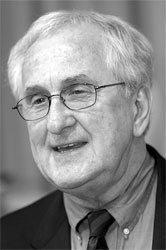 |
 |
|||||
 |
 |
 |
 |
 |
|||
 Father Don Cozzens: “I think there are countless Catholics today who lead faithful, prayerful, integrated lives, and they are a beneficial presence wherever they go.” A regular feature of The Catholic New World, The InterVIEW is an in-depth conversation with a person whose words, actions or ideas affect today’s Catholic. It may be affirming of faith or confrontational. But it will always be stimulating. . |
Catholics have ‘something to say’ to society
When Father Donald Cozzens came to speak at Dominican University’s Siena Center Feb. 2, his theme was “Speaking the Truth in a Culture of Denial.” Cozzens, a priest of the Diocese of Cleveland, is no stranger to controversy within the church; his 1999 book “The Changing Face of the Priesthood” sparked much discussion, especially about homosexuality and the priesthood, as have the more recent “Faith That Dares to Speak” and “Sacred Silence: Denial and the Crisis in the Church.” Cozzens, a writer in residence and religious studies teacher at John Carroll University, sat down with Catholic New World staff writer Michelle Martin following his presentation. The Catholic New World: What do you see as the most critical issues in the church? Father Donald Cozzens: The role of women in the church is the critical issue, and not just in the area of ministry, although that is critical. Most of our ministers in the church today are women, and the ordination issue remains very problematic. Thinking women today, especially women who have the privilege of a college education, many of them are sticking it out, but I think it’s because of a truly deep faith. Other issues would be, I think we need to have our theologians take a fresh look at our theology of human sexuality. I think sexuality is difficult for some clergy to talk about because it is always framed as a moral issue, and so I think it’s hard for us to address certain issues in sexuality candidly, in parishes, in classrooms and at the family kitchen table. TCNW: How has denial created these issues? FDC: I’m not sure that denial is a key factor—not that it isn’t a factor. I think the key factor is a reluctance and a fear to do fresh theology relating to these issues. There has been an attempt to terminate theological discussion in areas relating to human sexuality, relating to women in the church, because the church is saying these issues have been definitively settled. The climate of “There are certain things we can’t talk about because it will displease the elders” contributes to a kind of denial. TCNW: When you have that kind of a climate, do people go along, talk anyway, or leave? FDC: All of the above. There are some clergy who … will only talk about things that are in complete harmony with official positions. And I’m not talking here about revealed dogma. I’m talking about areas that by their very nature are meant to develop and evolve. We didn’t know that marriage was a sacrament until the 13th century, for example. The example of usury being intrinsically evil. Now the church doesn’t teach that any more, in fact the church has its own banks. Slavery—priests, bishops, religious owning slaves. I don’t think the church really spoke out against the non-voting rights of women, and that only goes back 90 years, so the parents and grandparents of the people (here today)—many of their grandmothers could not vote. I don’t think there was an outcry from many Catholic parishes. That’s not to criticize the church, because that was the climate at the time—or it’s not to criticize the church exclusively. We were smart enough to know at the turn of the century that women were full and equal members of the human family, and of course they should be allowed to vote. TCNW: In these issues, changes in the teaching have come with changes in the culture. Do you see that kind of dialogue as ongoing and necessary? FDC: I think church life cannot be removed from the mix of culture. I think we are always in a process of inculturation. We believe—we being the church—that we have something to say to our culture. We feel we’re a light to the world. I fear that some people today—meaning some church leaders—feel that it’s prudent and right for us to pull back, and be a voice against, rather than a voice participating in the discussion. As I read Vatican II, we are part of the world, even though we are trying to bring a note of liberation to it. But there is a great deal that we can bring to our culture, because I believe every culture is a mixture of light and darkness. This is one of the perennial issues facing the church: how do we relate to culture and to civilization? No doubt we have greatly shaped Western civilization. But what is our role right now? TCNW: We’re supposed to be a light for the world. But given the sex abuse scandal, a lot of people don’t see us that way. How do we be a light to a world that doesn’t want to see it? |
||
|
|
|||